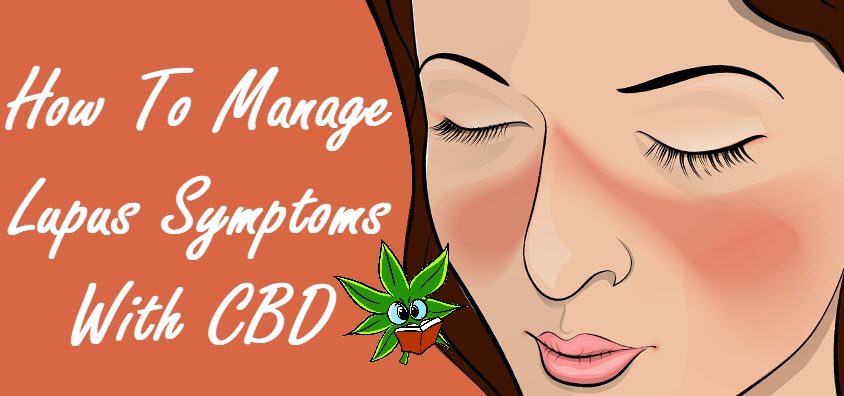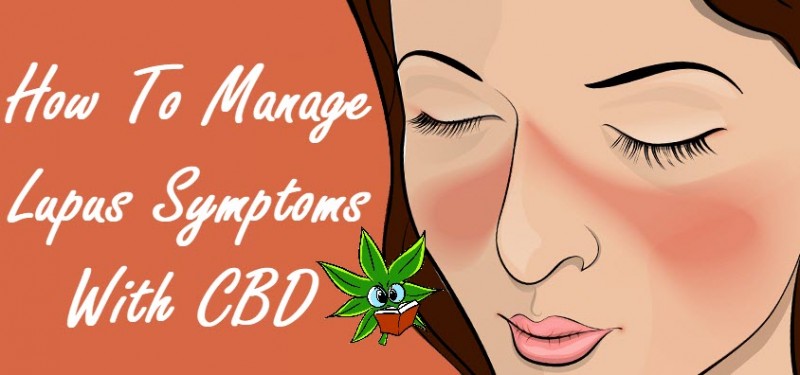How To Manage Lupus Symptoms With CBD

Lupus is a chronic condition characterized by the immune system attacking its own organs and tissues. As a result, patients with lupus suffer from massive inflammation all over the body. If left untreated, long-term damage and complications can arise.
With an estimated 1.5 million Americans suffering from lupus, plus 5 million people around the world, a safe and natural solution for this condition is needed. It can affect anyone even young kids, although women of childbearing age are the most affected demographic. One of its hallmark symptoms are a butterfly-pattern rash across the nose and cheeks; other symptoms include extreme fatigue, swelling, joint pain, fevers, inflamed lungs and heart, dry eyes, chest pain, and issues with circulation.
If the central nervous system is affected by lupus, it can cause seizures, depression, vision problems, and memory issues. In severe cases, lupus can cause kidney failures, stroke, and heart attacks.
Because lupus doesn’t have a cure, medications are prescribed for helping patients manage symptoms while reducing flare-ups. Prescription drugs for lupus run the gamut; these typically include nonsteroidal anti-inflammatory drugs (NSAIDS), opiates, anti-malaria drugs, immunosuppressant drugs, and corticosteroids. Depending on the patient’s symptoms, these medications can treat different forms of lupus although not without side effects. Lupus drugs can have serious impacts on the liver, kidney, and lungs, sometimes causing damage in the organs.
That’s where cannabis can help.
There has been some promising studies that cannabis can help patients with lupus, and many people are already using it with great success.
However, not all patients want to get high. While the THC in cannabis can provide relief from lupus symptoms, patients who prefer to have a clear head while medicating can benefit greatly from using CBD.
How CBD Helps Lupus Symptoms
Although lupus symptoms vary from one patient to another, they all have two things in common: inflammation and pain. CBD can help with those as well as the other symptoms of lupus.
Inflammation: When the body senses an infection, inflammation occurs as a way to treat it. Many studies have validated CBD’s prowess in addressing immune system-related conditions including autoimmune disorders. This is why CBD is hailed as one of the most powerful anti-inflammatory compounds out there – without any of the harmful side effects that come with taking pharmaceutical drugs. It also helps to fight oxidative stress on cells, and acts as an immunosuppressant on microglial cells and macrophages, which play an important role in immunity and inflammation.
Pain: CBD is a potent painkiller because when it latches itself on your receptors, its anti-inflammatory properties automatically reduce pain. Another way it works to treat pain is by inhibiting the absorption of anandamide, a compound that helps regulate how much pain we feel.
Anxiety and depression: When you’re constantly bogged down by pain, which stops you from doing the things you once could or even enjoyed, it can take a toll on your mental health. This is why patients with lupus are prone to suffering from anxiety and depression. CBD has been shown to have a tremendous positive impact on mental and emotional health, so supplementing with CBD can not only alleviate the physical symptoms of lupus but it can also contribute to an improved sense of wellbeing.
Using CBD For Lupus
There are many ways you can medicate with CBD, providing you with a variety of options to suit your tastes and preferences.
Edibles are a popular choice of medicating because they provide long-lasting pain relief. Depending on how strong a CBD edible is, on average they can last for as long as 10 hours. CBD edibles won’t get you high but are an effective way to provide you therapeutic cannabinoids from inside out.
CBD oils can be vaporized to enjoy fast-acting relief from lupus symptoms. Choose CBD oils made from hemp, which possesses higher levels of CBD than cannabis.
Capsules are an efficient way to dose your CBD. Taking CBD capsules everyday are a beneficial way to reduce inflammation while helping strengthen your immune system. CBD capsules are available in a wide variety of doses and they are not addictive.
Interactions
If you are already taking existing medications for lupus, keep in mind that CBD may interact with some of them. To minimize the risk of harmful interactions, talk to your doctor ahead of time.
ALSO CHECK OUT THESE STORIES ON LUPUS...
HOW CANNABIS IS HELPING LUPUS PATIENTS, CLICK HERE.








